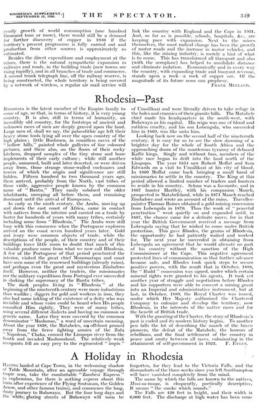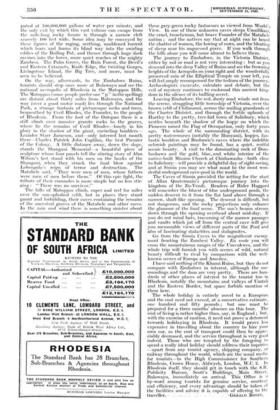A Holiday in Rhodesia
HA,. landed at Cape Town, in the welcoming shadow of Table Mountain, after an agreeable voyage through tropic seas, take the comfortable "Zambesi Express " (a euphemism, for there is nothing express about this train after experience of the Flying Scotsman, the Golden Arrow, and other famous trains), and commence the long, dusty journey to Bulawayo. But the four long days and the white,-glaring streets 'of Bulawayo- will soon be
forgotten, for they lead to the Victoria Falls, and the discomforts of the three weeks since you left Southampton will have vanished completely from the mind.
The name by which the falls are known to the natives, Mosi-oa-tutiya, is eloquently, poetically descriptive. It means " the smoke which sounds."
The Falls are 420 feet in height, and their width is 6;000 feet. The discharge at high water has been coin-
pined at 100,000,000 gallons of water per minute, and the only exit by which this vast volume can escape from the mile-long rocky fissure is through a narrow cleft scarcely 100 feet wide. Some idea May be conveyed by these figures of the raging, seething, maddened torrent which tears and foams:its blind way into the swirling eddies of the Boiling Pot, and thence through huge'dark ravines into the lower, more quiet reaches of the mighty Zambesi. The Palm Grove, the Rain Forest, the Devil's and Eastern Cataracts, Knife Edge, the twisting Gorges, Livingstone Island, the Big Tree, and more, must be seen to he believed.
On the way, afterwards, to the Zimbabwe Ruins, tourists should stop once more at Bulawayo and see the national necropolis of Rhodesia in the Matoppos Hills. The Matoppos (sonic people prefer one "p'.' in the spelling) arc distant about thirty miles from Bulawayo, and the way (over a good motor road) lies through the National Park, a strange fantasia of picturesque rocks and trees, bequeathed by Cecil Rhodes, the Founder, to the people of Rhodesia. From the foot of the Outspan there is a stiff climb over massive granite rocks to the graves, where lie the remains of Cecil Rhodes—lonely in his glory in the shadow of the giant, encircling boulders— Leander Starr Jameson, and—only interred last month there—Charles Patrick John Coghlan, the first Premier of the Colony. A little distance away, down the slope, stands the Shangani Memorial—a beautiful piece of sculpture whose four pastels tell the stirring story of Alan Wilson's last stand with his men on the banks of the Shangani, when they struck the final blow against Lobengula's reign of terror and destruction. The Matabelc said, ` They were men of men, whose fathers were men of men before them." Of this epic fight, the tribute of their comrades is more simple but no less stir- ring : " There was no survivor."
The hills of Matoppos climb, caper and reel for miles over the sun-splashed veldt, but in places they stand gaunt and forbidding, their caves containing the remains of the ancestral graves of the Matabele and other races. In the rain and wind there is something sinister about these_ grey-green rocky fastnesses as viewed from World's View. In one of these unknown caves sleeps. Umzilikazi, the cruel, treacherous, but brave Founder of the Matabele nation ; and the natives say that at night can be heard the chatter of women, the lowing of cows, and the bleating of sheep near his unguessed grave. If you walk through the hills alone you will come almost to believe them.
The journey to Zimbabwe, in the Victoria District, either by rail or road is not very interesting : but as you
descend into the deep Valley.of Ruins and see the frowning heights of the Acropolis on your right and the wonderfully preserved ruin of the Elliptical Temple on your left, you will feel amply recompensed for the tedium of the journey. -Arehmologists excavate, calculate and debate, but the veil of mystery continues to enshroud this ancient king- dom in the silence of its baffling secret.
Leaving Zimbabwe, the red, dusty road winds out from the serene, straggling little township of Victoria, over the brown veldt of Chilimanzi, across the smiling grasslands of the Charter District, and through the'fertile uplands of Hartley to the pretty, tree-hid town of Salisbury, which nestles beneath the shadow of the kOpje on which the Pioneers raised the Flag of Occtipation, only forty years ago. The whole of the surrounding '`'district, with its pretty watercourses (notably the Hunyani), kopjes, fan- tastic boulders and Bushnien's caves wlire the indelible ochreish paintings may be found, has a quiet, restful scenic beauty. A visit to the dominating rock of Dom- boshawa and the gold, blUe, and white interior of the native-built Mission Church at ChishaWasha*both close to Salisbury—will provide a delightful day of sight-seeing, and at Sinoia you may see what must be the most won-
derful underground cave-pool in the World. -
The Caves of Sinoia proVided the:setting for the start of Allan Quatermain's picturesque journey into the kingdom of the Zu-Vendi. Readers of Rider Haggard will remember the bluest of blue underground pools, the sudden descent to it from the flat land above through a narrow, shaft-like opening. The descent is difficult, but not dangerous, and the rocky projections only enhance the glamour of the final scene. The sun's beams stream down through the opening overhead about mid-day. If you do not mind bats, traversing of the narrow passages and vaults which jut off from the central cave. will give you memorable views of different parts of the Pool and also of fascinating stalactites and stalagmites.
Go from the Sinoia Caves to the magnificent escarp- ment fronting the Zambesi Valley. En route you will cross the mountainous ranges of the Umvukwes, and the whole trip will furnish you with scenes of wild, natural beauty difficult to rival by comparison with the well- known scenes of Europe and America-. "
I have said nothing of the Khami Ruins, but they do not compare with Zimbabwe in interest, although the sur- roundings and the dam arc very pretty. There are hun- dreds of other places of interest to the tourist too iii Rhodesia, notably the mduntains- and valleys of Umtali and the Eastern Border, but space forbids mention' of them here.
The whole holiday is entirely novel to a European and the cost need not exceed, at a conservative estimate, one hundred and fifty pounds ; but one must he prepared for a three months' absence on this tour. The cast of living is rather higher than, say, in England ; but, with the exercise of caution, it need not prove a deterrent towards holidaying in Rhodesia. It would prove less expensive in travelling about the country to hire your own car, as the cost of transport, could then be appre- ciably decreased, and the service throughout is very good indeed. Those who are tempted by the foregoing to spend a really ideal holidaY'should address their inquiries —apart from any tourist agency, shipping company, or railway throughout the world, which are the usual media for, tourists—to the High Commissioner for Southern Rhodesia, Crown House, Aldwyeh, London, W.C. 2. In Rhodesia itself, they should get, in touch with the, Publicity Bureau, . Scott's Main Street, Bulawayo, immediately on arrival. This Office is a by-word among tourists for genuine service, courtesy, and efficiency, and every advantage should be taken of the facilities and advice it is capable of offering to the traveller,











































 Previous page
Previous page